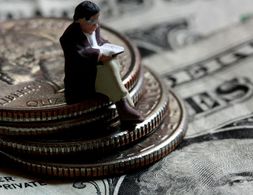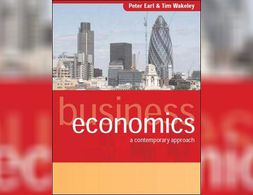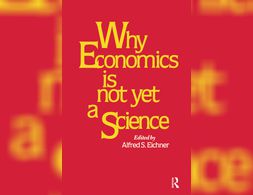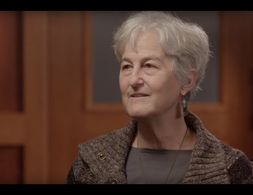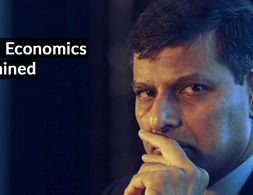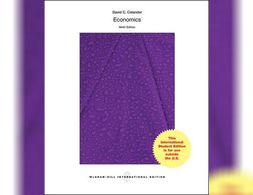✕
833 results
In this lecture Ben Fine aims at stimulating interest for and explaining the relevance of Marxist Political Economy. Ben Fine dedicates the first half of his comprehensible lecture to the question on how mainstream economics became the way it is by explaining its key concepts and how those evolved during the past 150 years. While critically reflecting those concept he also emphasizes that mainstream economics does not consider historical processes. This is the point of departure on his presentation of the core terms and crucial categories of Marxist Political Economy: e.g. the production process and class relations (Part 1). Part 2 examines the consequences of the capitalist mode of production and its propensity to crises. Ben Fine illustrates this Marxist analysis with the example of the current crisis and explains current conditions for the accumulation of capital.
The article is a formal response to the debate between the economists Diane Coyle and Howard Reed, whose articles were published online by Prospect magazine in 2018. Then, it was taken by Rethinking Economics as representative for the vision of the global network which advocates for changing economics curricula. In fact, it clearly solves some issues within the debate around pluralism by explaining its common misunderstandings among academics and its true - often mislead - meaning.
The authors discuss how identity affects economic outcomes by bringing together psychological and sociological perspectives and economics. For economic outcomes of a single individual, it might be interesting which kind of social groups this individual belongs to. This may influence individual daily decisions and hence economic outcomes. It can, however, not only affect individual economic outcomes but also economic outcomes of organizations, institutions and other groups. This paper describes these influences with respect to gender in the workplace, to the economics of poverty and social exclusion, and to the household division of labour.
Designed for both undergraduates and MBA students taking their first course in business economics, this text focuses on introducing students to economics as a framework for understanding business. It is structured around problems that decision-makers face, such as rejuvenating the firm in the face of declining demand.
This article applies insights from behavioral economics to consider how the general public may make decisions around whether or not to receive a future COVID-19 vaccine in a context of frequent side effects and preexisting mistrust. Three common cognitive biases shown to influence human decision-making under a behavioral economics framework are considered confirmation bias, negativity bias, and optimism bias.
First published in 1983. A collection of papers directed at those outside the field of Economics, to open up discussions around the scientific worth of Economics.
In the inspiring interview on Economics of Care, Nancy Foblre takes a closer look to the consequences of the marketization of caring activities on those activities and on the societal organization of care. Folbre elaborates on how to value care and how this shifts the perspectives on living standards. She points to the fact, that caring activities are undervalued both in the market sphere and within the family and thereby questions the division between those spheres. Lastly, Folbre answers the question how to reteach Economics when accounting for caring activities.
In this short video 'Raghuram Rajan’s Dosa Economics Explained', the famous theory of Dr. Raghuram Rajan, ex-governor of Reserve Bank of India (RBI), Dosa Economics, has been explained using a very simple example of Dosa ( a delicacy of India). Here, Dr. Raghuram Rajan tries to explain that low interest rate and low inflation is much better than high interest rate and high inflation.
This Perspective argues that ergodicity — a foundational concept in equilibrium statistical physics — is wrongly assumed in much of the quantitative economics literature. By evaluating the extent to which dynamical problems can be replaced by probabilistic ones, many economics puzzles become resolvable in a natural and empirically testable fashion.
This brief responds to the criticism that mainstream economics is currently facing due to its heavy reliance on models and narrow range of quantitative research techniques. It takes a broader view, identifying issues that are also relevant for heterodox and pluralist approaches to economics.
Helps students succeed in the principles of economics course. This title offers trademark colloquial approach that focuses on modern economics, institutions, history, and modeling, and is organized around learning objectives to make it easier for students to understand the material and for instructors to build assignments within Connect Plus.
"This eleven-week course offers a pluralist introduction to political economy and economics. We will examine nine (9) competing schools of thought, each of which offer an original and distinctive illumination of economic and social reality. The course offers a level of learning that would at least match that which is offered by a University. However, you do not need to be connected to a university or to have studied political economy or economics previously to enrol in this particular subject."
This collection of videos offers a short introduction to ecological economics and its main differences with respect to environmental economics.
This syllabus provides an overview of the content of the Philosophy and Economics course at the University of Waterloo.
This guide contains a collection of recommended YouTube channels and YouTube videos in the fields of economics, business and economic policy.
This book provides a new methodological approach to money and macroeconomics. Realizing that the abstract equilibrium models lacked descriptions of fundamental issues of a modern monetary economy, the focus of this book lies on the (stylized) balance sheets of the main actors. Money, after all, is born on the balance sheets of the central bank or commercial bank.
Health Economics traditionally involves two distinct strands. One focuses on the application of core neoclassical economic theories of the firm, the consumer and the market to health-seeking behaviour and other health issues. It suggests a role for government intervention only in the case of specific market failures (for example externalities, asymmetric information, moral hazard, and public goods) that distort market outcomes. The second strand is evaluation techniques, used to assess the cost effectiveness of competing health interventions.
After completing the workshop in Post Keynesian Economics participants should be able to describe the main differences and similarities between PKE and other schools of thought.
This syllabus provides an overview of the contents of the course "The Philosophy and Methodology of Economics" at the Duke University
Participants should be able to distinguish the strictly non-cooperative (methodological individualist) foundations of traditional neoclassical economics as being couched in self-interested individuals, as well as having basic knowledge of an alternative set of theories based on the primacy cooperation and social norms and extending the breadth of economic analysis beyond exchange.
The workshop deals with the contribution of Plural Economics to the urgently needed change of the economic system towards sustainability and global responsibility.
After completing the module, participants should be able to demarcate and explain different economic approaches to sustainability. They should be able to evaluate the respective concepts based on their contribution to the ecological transformation of the economic system.
Completing the Economics of Discrimination module, the students should have acquired knowledge and understanding of the existing similarities and differences of the definition and analysis of discrimination across economic theory and cultural theory.
An essay of the writing workshop on contemporary issues in the field of Nigerian economics: In Nigeria, it appears that there is nothing in the constitution, which excludes the participation of women in politics. Yet, when it comes to actual practice, there is extensive discrimination. The under-representation of women in political participation gained root due to the patriarchal practice inherent in our society, much of which were obvious from pre-colonial era till date.
This historic timeline presents economic events, economic thinkers and schools of thought from the 18th century until the 2007/2008 financial and economic crisis with short texts on the respective event or perspective.
Exploring Economics, an open-source e-learning platform, giving you the opportunity to discover & study a variety of economic theories, topics, and methods.
The module is designed to first present some of the main schools of thought from a historical and methodological perspective. Each week we explore and critically assess the main tenants of each school of thought. In the second part of the module we link history of economic thought and methodology to a specific and contemporary economic question. The second part allows you to engage with current economic issues with an awareness of methodology and methodological differences and with some knowledge of the history of economics.
Traditionally, economists have attributed consistency and rational calculation to the action of ‘economic man’. In a powerful challenge to orthodox thinking, Geoffrey Hodgson maintains that social institutions play a central and essential role in molding preferences and guiding action: institutions are regarded as enabling action rather than merely providing constraints.
This course is an introduction to Development Economics and is concerned with how economists have sought to explain how the process of economic growth occurs, and how – or whether – that delivers improved well-being of people.
The world of economics is changing. Years of turmoil in the global economy mean that nothing will ever be quite the same again. This is the starting point and theme of this radically revised Economist books classic.
The premise of this workshop is that we, as knowledge producers - especially within westernized universities (Grosfoguel, 2013), are significantly implicated in neoliberal imaginaries that are often in service of hierarchical, binary, competitive and linear narratives of growth as civilizational progress.
Environmental catastrophe looms large over politics: from the young person’s climate march to Alexandria Ocasio-Cortez’s Green New Deal, increasing amounts of political space are devoted to the issue. Central to this debate is the question of whether economic growth inevitably leads to environmental issues such as depleted finite resources and increased waste, disruption of natural cycles and ecosystems, and of course climate change. Growth is the focal point of the de-growth and zero-growth movements who charge that despite efficiency gains, increased GDP always results in increased use of energy and emissions. On the other side of the debate, advocates of continued growth (largely mainstream economists) believe that technological progress and policies can ‘decouple’ growth from emissions.
This paper surveys the development of the concept of socialism from the French Revolution to the socialist calculation debate. Karl Marx’s politics of revolutionary socialism led by an empowered proletariat nurtured by capital accumulation envisions socialism as a “top-down” system resting on political institutions, despite Marx’s keen appreciation of the long-period analysis of the organization of social production in the classical political economists. Collectivist thinking in the work of Enrico Barone and Wilfredo Pareto paved the way for the discussion of socialism purely in terms of the allocation of resources. The Soviet experiment abandoned the mixed economy model of the New Economic Policy for a political-bureaucratic administration of production only loosely connected to theoretical concepts of socialism. The socialist calculation debate reductively recast the problem of socialism as a problem of allocation of resources, leading to general equilibrium theory. Friedrich Hayek responded to the socialist calculation debate by shifting the ground of discussion from class relations to information revelation
We use cookies on our website. Click on Accept to help us to make Exploring Economics constantly better!


